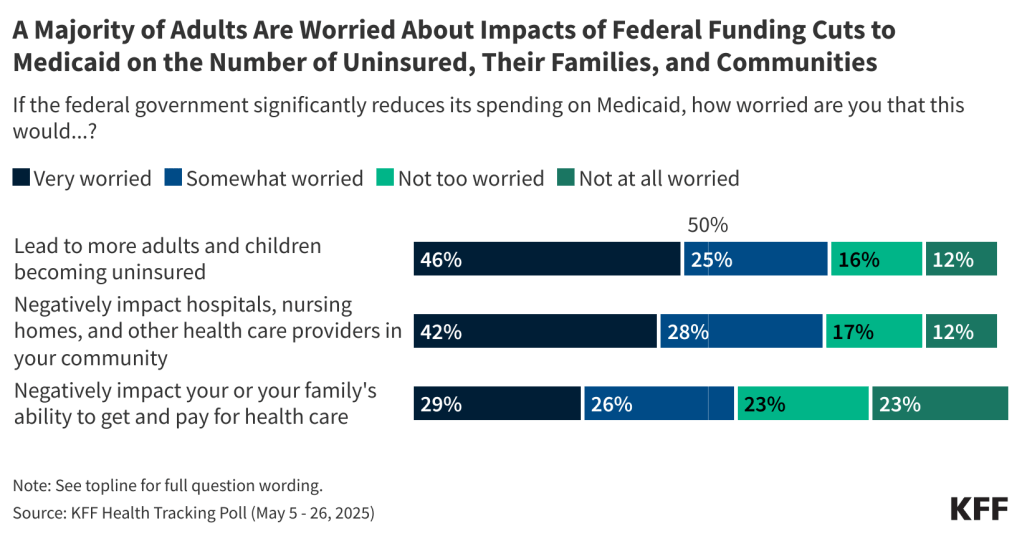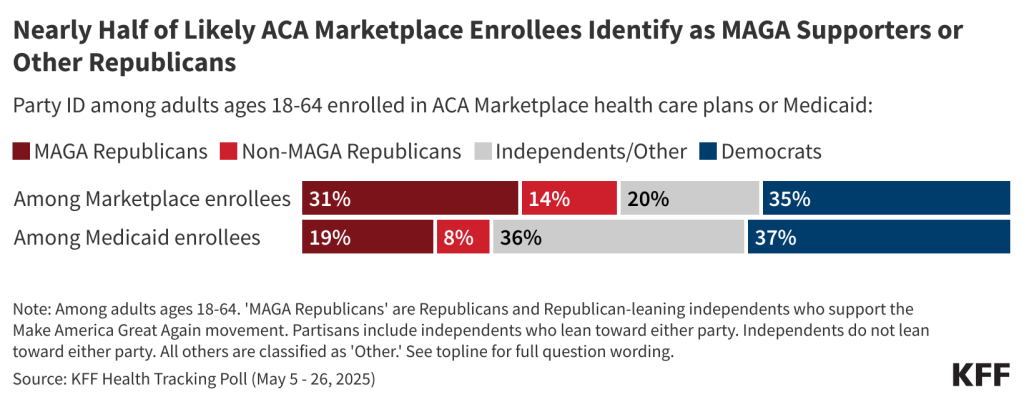More Than Half of the Public Worries Federal Medicaid Budget Cuts Would Affect Their Family’s Ability to Obtain and Afford Care; More Worry It Will Increase the Uninsured
More ACA Marketplace Enrollees Are MAGA Supporters or Other Republicans Than Democrats
As Congress weighs spending cuts and other changes to Medicaid, more than half (54%) of the public say they are worried significant reductions in federal Medicaid spending would negatively affect their family’s ability to obtain and afford health care, a new KFF Health Tracking Poll finds. This includes about three in 10 (29%) who say they are “very worried” about such an outcome.
Democrats (69%) and independents (68%) are much more likely to say they are worried about the impact of potential Medicaid cuts on their families compared to Republicans generally (31%) and supporters of President Trump’s Make America Great Again (MAGA) movement specifically (26%).
Among Medicaid enrollees themselves, a large majority (86%) worry about the impact of cuts on their families, including six in 10 (60%) who say they are very worried. Three- quarters (76%) of MAGA supporters and other Republican Medicaid enrollees say they are worried about the potential impact of federal spending reductions on their families, as are about half (53%) of Republicans with household incomes less than $40,000.
About seven in 10 people overall also say they are worried federal Medicaid spending reductions would lead to more adults and children becoming uninsured (72%, including 46% who are “very worried”) and would negatively impact hospitals, nursing homes, and other health care providers in their communities (71%, including 42% who are “very worried”).

These concerns are shared by residents of rural communities, where providers often rely heavily on funding from Medicaid and other government health care programs.
Among rural residents, about half (52%) say they are worried that Medicaid funding reductions would impact their or their family’s ability to get or pay for care. A sizeable majority of rural residents also worry that spending reductions would lead to more adults and children becoming uninsured (69%) and would negatively impact health care providers in their communities (66%).
Nearly Half of Marketplace Enrollees Identify as MAGA Supporters and Other Republicans
With Congress and the Trump administration weighing changes to the Affordable Care Act (ACA), the poll shows that ACA Marketplace enrollees represent a diverse group.
Nearly half (45%) of those who purchase their own health insurance plans – the vast majority of which are ACA Marketplace plans – identify as or lean Republican, including three in 10 (31%) who identify as MAGA supporters. Smaller shares identify as Democrats or Democratic-leaning independents (35%), or do not lean toward either party (20%).
Among Medicaid enrollees, about a quarter (27%) identify as MAGA supporters or other Republicans.

Partisans Split on Trump Administration’s Impact on Medicaid and Medicare
About six in 10 adults say the Trump administration’s policies will weaken Medicaid (59%) and Medicare (57%), more than twice the share who say the policies will strengthen each program (19% and 23%, respectively). Half of adults (49%) say the Trump administration’s policies will weaken health care services for veterans, a larger share than say the policies will strengthen care for veterans (32%).
Unsurprisingly, there are dramatic differences in how partisans view the Trump administration’s impact in each of these areas.
For example, much larger shares of Democrats (91%) and independents (70%) than Republicans (22%) expect the administration’s policies to weaken Medicaid. In contrast, more Republicans (42%) than Democrats (3%) or independents (7%) say that the administration’s policies would strengthen Medicaid. Among Republicans who get their insurance from Medicaid, roughly as many expect Trump’s policies to weaken the program (34%) as expect them to strengthen it (35%).
Designed and analyzed by public opinion researchers at KFF, this survey was conducted May 5-26, 2025, online and by telephone among a nationally representative sample of 2,539 U.S. adults in English and Spanish. The margin of sampling error is plus or minus 3 percentage points for the full sample. For results based on other subgroups, the margin of sampling error may be larger.